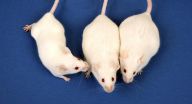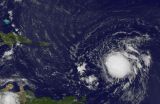(Press-News.org) Nobody likes flight delays, but they are a common occurrence: In 2011, about 20 percent of U.S. flights were at least 15 minutes behind schedule. Those delays irritate passengers and, in 2010, added an estimated $6.5 billion to U.S. airlines' operating costs.
Delays tend to hit some airlines harder than others, due to the approach the Federal Aviation Administration (FAA) uses to resolve them. This approach places an emphasis on minimizing aggregate system delays, nationwide -- a policy that affects some airlines much more than others at a given time.
But now a study by MIT researchers presents a new method for dealing with delays that, they conclude, keeps system-wide delays virtually constant while distributing delays among airlines more evenly. Specifically, it lets airlines distribute delays among themselves more evenly by allowing them to swap schedule slots with each other. The result, the researchers say, is more fair, without sacrificing efficiency.
"The price of fairness is small," says Dimitris Bertsimas, the Boeing Leaders for Global Operations Professor of Management at the MIT Sloan School of Management and co-author of a paper detailing the findings.
The paper, published in the journal Transportation Science, is co-authored by Bertsimas and Shubhum Gupta of MIT's Operations Research Center.
Proof of concept
The current air traffic flow-management system used by the FAA uses multiple algorithms, or sets of rules, to manage aggregate delays. These include ground-delay programs, which hold flights at their airports of origin when necessary, and airspace-flow programs, which control the arrivals into areas suffering delays, often due to bad weather.
Bertsimas -- who has analyzed and published papers on air-traffic networks dating back to the 1990s -- and Gupta then constructed a model using some different rules. Their proposal would let airlines switch certain time slots with each other, with limitations placed on the amount of time any flight could be delayed when such swaps are made.
The researchers then tested their model using a comprehensive set of data covering six full days of air service in the U.S., which were randomly selected from the years 2004, 2005, and 2006. The data included the 55 biggest airports in the U.S. and the five biggest airlines (measured by the number of flights) at the time, which were Southwest, American, Delta, United, and Northwest (which has since merged with Delta). There were over 30,000 flights operated on those days combined.
When Bertsimas and Gupta simulated what air traffic would have looked like on those six days using their alternate system, they found that the aggregate delays in the entire air-traffic system were virtually unchanged. On none of the six days did total delays differ from the empirical results by more than 1.0 percent, and the mean difference was 0.1 percent. And given the guideline of equalizing delays among airlines, the simulation maintained a scenario in which each airline was able to swap an identical number of flight-schedule slots.
Fairness and stable systems
Bertsimas notes that the computational side of the proposed system is fast enough to solve airline-network problems more quickly than they arise -- a crucial point, because otherwise schedule changes in any given day would be obsolete before they could be implemented.
The kinds of optimization problems explored in the current airline paper, Bertsimas notes, can be solved dramatically more quickly than they could about a quarter-century ago. The type of software used in the study performs its calculations 580,000 times more quickly than it did in 1991; the computer hardware in use is 320,000 times faster. The "total speedup," as Bertsimas terms it, means optimization solutions can be calculated 200 billion times more quickly than in 1991.
"You can solve a problem the size of the U.S. [air network] in seconds," Bertsimas says.
The best rationale for tweaking the airline scheduling system as the paper suggests, Bertsimas believes, is that ultimately fairness is one of three elements that makes such operations work, along with optimization that makes systems efficient, and robustness that prevents systems from failing. Markets that fail fairness tests fare poorly over time.
"If a system is viewed as not fair, it is not stable," Bertsimas concludes.
INFORMATION:
Additional background
ARCHIVE:
New model calculates how air transport connects the world
ARCHIVE:
Flying the not-so-friendly skies
While exploring the remote coral reefs of Raja Ampat in Indonesia, Dr. James Thomas from the Halmos College of Natural Sciences and Oceanography, Florida, and his colleagues from Naturalis Natural History museum in the Netherlands, stumbled across a small but extraordinary crustacean living inside another reef invertebrate in a commensal association (without causing any harm, nor benefit to its host).
In his amazement to the amphipod's unusual form, Dr. Tomas called it L. eltoni after musician and actor Sir Elton John. The research is available in the open access journal ...
Female mice exposed in utero, or in the womb, to low levels of arsenic through drinking water displayed signs of early puberty and became obese as adults, according to scientists from the National Institutes of Health. The finding is significant because the exposure level of 10 parts per billion used in the study is the current U.S. Environmental Protection Agency standard, or maximum allowable amount, for arsenic in drinking water. The study, which appeared online August 21 in the journal Environmental Health Perspectives, serves as a good starting point for examining ...
The Global Precipitation Measurement or GPM mission core satellite can measure rainfall from space, and saw heavy rainfall in the Central Pacific's Loke when it was a hurricane.
Hurricane Loke formed southwest of the Hawaiian Islands on August 21, 2015 but Loke has not been a threat to Hawaii because it intensified to hurricane strength while moving well west of Hawaii over the open waters of the Pacific Ocean.
The GPM core observatory satellite measured precipitation within the hurricane as it flew above the most powerful thunderstorms in the hurricane on August 25, ...
"If I offered you a bruised banana, you probably wouldn't be interested," said Jonathan Deutsch, PhD, director of Drexel University's Center for Hospitality and Sport Management. "But what if I offered you some banana ice cream on a hot summer day? I bet you'd find that a lot more appealing."
It was this simple observation that inspired a new model for recovering would-be wasted - or surplus - food and repurposing it to feed hungry people, generate revenue and even create jobs. The model was recently piloted in West Philadelphia, home to a large population of low-income ...
Summertime is waning, and that means the end of backyard barbecues is almost upon us. That also means an end to dousing charcoal briquettes with lighter fluid. Reducing the use of lighter fluid might not be a bad thing, as many of those products are made from crude oil and emit potentially harmful compounds when lit. Now, researchers report in ACS Sustainable Chemistry & Engineering that they developed a waste-paper-based, environmentally friendly and sustainable alternative.
Igniting fires has been a keystone to human civilization. Ancient communities used plant and ...
As Tropical Storm Ericka continued moving toward the Lesser Antilles, NASA's Aqua and other satellites were gathering data. Satellite imagery showed strong thunderstorms wrapped around Erika's center.
Infrared data, such as that gathered by the Atmospheric Infrared Sounder (AIRS) instrument that flies aboard NASA's Aqua satellite is used to determine cloud top temperature. The colder the cloud tops, the higher they are in the atmosphere, and they are usually stronger. Cloud tops around Erika's center were near -63F/-53C, indicating strong thunderstorms.
A Tropical Storm ...
Individuals previously diagnosed with heart disease may be less likely to experience heart failure, heart attacks, or stroke, or to die from these events, if they have higher blood levels of two very closely related proteins, according to a new study led by a UC San Francisco research team.
One of these proteins, known as GDF11, has attracted great interest since 2013, when researchers showed that it could rejuvenate old mice. Based on these findings, scientists have speculated that drugs that increase GDF11 levels might reverse physiological manifestations of aging that ...
Researchers from the University of Birmingham have shown that drinking 500ml of water at half an hour before eating main meals may help obese adults to lose weight. They believe that the simple intervention could be hugely beneficial, and be easily promoted by healthcare professionals and through public health campaigns.
Obese adult participants were recruited from general practices and monitored over a 12 week period.
Each of the participants, all adults with obesity, were given a weight management consultation, where they were advised on how to adapt their lifestyle ...
PITTSBURGH, Aug. 26, 2015 - Obese women are nearly twice as likely as their lean counterparts to have stillborn babies for several specific, potentially preventable medical reasons, a new University of Pittsburgh Graduate School of Public Health analysis reveals.
Placental diseases and hypertension were the most common causes of stillbirth among obese women, according to the study, published online and scheduled for the October issue of the American Journal of Clinical Nutrition. The research was supported by the National Institutes of Health (NIH).
"We've known for ...
A group of intrepid Israeli researchers recently went back to the dawn of the Stone Age to make lunch.
Using 12,500-year-old conical mortars carved into bedrock, they reconstructed how their ancient ancestors processed wild barley to produce groat meals, as well as a delicacy that might be termed "proto-pita" - small loaves of coal-baked, unleavened bread. In so doing, they re-enacted a critical moment in the rise of civilization: the emergence of wild-grain-based nutrition, some 2,000 to 3,000 years before our hunter-gatherer forebears would establish the sedentary ...




